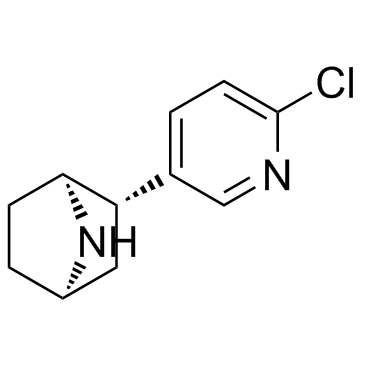148152-66-3
| Name | (+)-epibatidine dihydrochloride |
|---|
| Description | (±)-Epibatidine is a nicotinic agonist. (±)-Epibatidine is a neuronal nAChR agonist. |
|---|---|
| Related Catalog | |
| Target |
nAChR[1] |
| In Vitro | Intracerebroventricular injection of (±)-Epibatidine (0.1 μg) significantly increases intercontraction interval (ICI) but does not change pressure threshold (PT) or maximal voiding pressure (MVP), whereas 1 μg of (±)-Epibatidine increases PT and MVP (P<0.05) and decreased ICI. A low intravenous dose of (±)-Epibatidine (0.001-0.1 μg) has no effect; however, a large dose of (±)-Epibatidine (1 μg) significantly decreases ICI and increases MVP (P<0.05) but does not change PT (P>0.05). (±)-Epibatidine has not only a potent stimulatory effect on nAChR subtypes in the brain (α4β2) but also in sympathetic and parasympathetic ganglia (α3β4) and at the neuromuscular junction (α1β1γδ) [1]. |
| Animal Admin | Rats[1] Voiding is studied in urethane-anesthetized (1.2 g/kg sc) or awake female Sprague-Dawley rats (250-300 g). In all experiments, control cystometrograms (CMGs) are recorded for ~2 h before intracerebroventricular and intravenous injection of vehicle or (±)-Epibatidine solutions. Dose-response curves are constructed by administering increasing doses of (±)-Epibatidine [0.001-1 μg in 1 μL intracerebroventricularly (icv); 0.001-1 μg in 200 μL iv] at 30-min to 2-h intervals. (±)-Epibatidine is administered ~30 min after vehicle (aCSF, 1 μL icv; or saline solution, 200 μL iv). Chlorisondamine (10 μg, 1 μL icv) is injected 10-30 min before (±)-Epibatidine via the intracerebroventricular route in some experiments to block the effect of the agonist. The intravesical pressure to induce micturition (PT), MVP, and intercontraction interval (ICI; the interval between voids or reflex bladder contractions) are measured and converted into percent change from control values[1]. |
| References |
| Molecular Formula | C11H13ClN2 |
|---|---|
| Molecular Weight | 208.69 |
| PSA | 24.92000 |
| LogP | 4.27570 |
